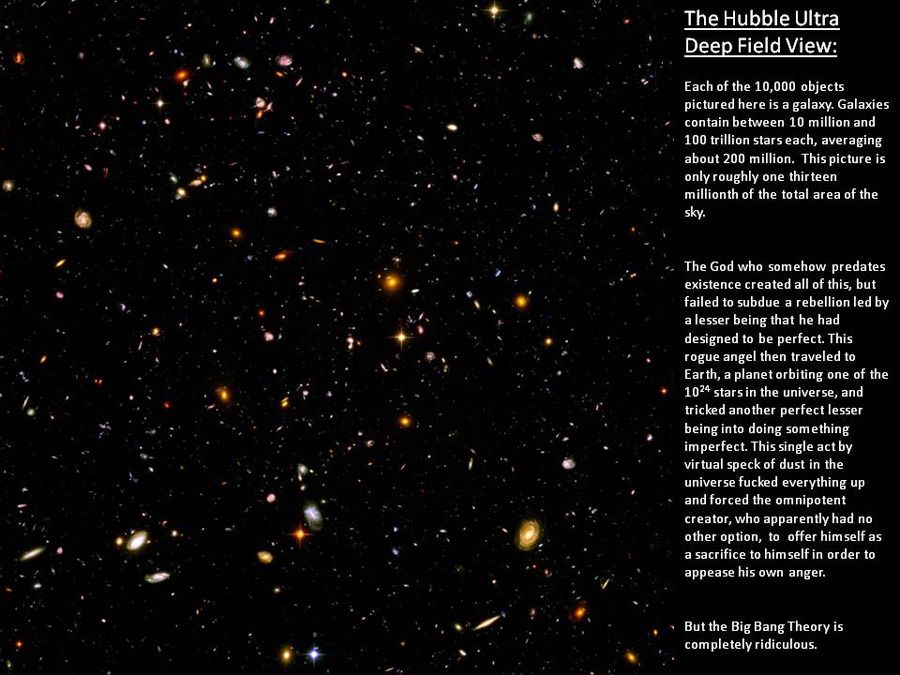Still playing over at Quora.com. Here’s a recent question:
Why, despite its clear violation of the First Amendment’s Free Exercise Clause, is there still “In God we trust” on US currency and in courtrooms?
The Free exercise Clause:
‘GOVERNMENT shall make no law respecting any organization of religion or prohibit the free exercise there of.’AND The CONGRESS ACTION THAT WAS PASSED UNCONSTITUTIONALLY AND IN BLATANT VIOLATION OF OUR INALIENABLE RIGHTS:!!!
As a result, the 84th Congress passed a joint resolution “declaring IN GOD WE TRUST the national motto of the United States.” The law was signed by President Eisenhower on July 30, 1956, and the motto was progressively added to paper money over a period from 1957 to 1966.
Federal endorsement of a deity or religion violates THE US CONSTITUTION.
So, in light of this should be removed asap.
I replied:
You are aware that from the founding of the nation the Senate and the House of Representatives have each had, at government expense, a chaplain? And one of the duties of that chaplain is to open each session of each legislative body with a prayer?
Are you familiar with the “Original Public Understanding” theory of Constitutional law? I suggest you look it up. Your understanding of the First Amendment is flawed.
A reader took exception:
Lisbeth Salandar wrote:
No Kevin, ACTUALLY having a chaplain say a prayer in a secular government body is also severly unconstitutional you history oblivious fool.
My understanding of the first Amendment is based entirely on the words contained within it cûlt boy.
You are competely entitled to your opinions which are not supported by evidence.
But the moment you spread that opinion as fact you are a liar.
And if you spread it as fact knowing well it is an opinion you are both a liar and a fraud.Government shall make no law respecting any organization of religion or prohibit the free exercise thereof.
Can you read?
It isn’t a bible you can just be an apologist for later and say is metaphor Ya non- reasoning dolt it’s an INALIENABLE RIGHT-not subject to your falsifiable and cûlt deluded opinion.
Well! As Randall Munroe observed: I can’t go to bed, someone is wrong on the internet! So of course I had to respond:
Well, so much for Be Nice, Be Respectful.
Apparently you’re under the impression that I belong to a “cûlt.” I assume from this (having had some experience in this arena) that you mean I’m religious, probably some form of Christian. However, I assure you I am an atheist, but apparently not of the same sect as you. My beliefs are obviously heretical to yours, thus your need to verbally burn me at the stake for denying your TRUTH.
So your understanding of the First Amendment is based entirely on the words contained in it? How nice. You’re not a lawyer, then? Well, neither am I, but I’ve studied American Constitutional law on my own for about the last twenty years. I’ve read enough court decisions to make one’s eyes bleed, and I’ve read the non-judicial statements of judges and Justices in great stacks.
And you propose to stand here and tell me that you would argue to James Madison, “Father of the Constitution,” that the First Amendment prohibits the offices of Chaplain of the House and the Senate, and he’d agree with you?
Sorry. Not buying. Not even close.
The law is NEVER based exclusively on the text. That invites “reinterpretation” over time – the so-called “living Constitution” theory. Let me throw some quotes out to you:
“Our Revolution commenced on more favorable ground. It presented us an album on which we were free to write what we pleased. We had no occasion to search into musty records, to hunt up royal parchments, or to investigate the laws and institutions of a semi-barbarous ancestry. We appealed to those of nature, and found them engraved on our hearts. Yet we did not avail ourselves of all the advantages of our position. We had never been permitted to exercise self-government. When forced to assume it, we were novices in its science. Its principles and forms had entered little into our former education. We established however some, although not all its important principles. The constitutions of most of our States assert, that all power is inherent in the people; that they may exercise it by themselves, in all cases to which they think themselves competent, (as in electing their functionaries executive and legislative, and deciding by a jury of themselves, in all judiciary cases in which any fact is involved,) or they may act by representatives, freely and equally chosen; that it is their right and duty to be at all times armed; that they are entitled to freedom of person, freedom of religion, freedom of property, and freedom of the press.” — Thomas Jefferson pp.46 – 47, The Living Thoughts of Thomas Jefferson, John Dewey, presenter.
—
“On every question of construction (of the Constitution) let us carry ourselves back to the time when the Constitution was adopted, recollect the spirit manifested in the debates, and instead of trying what meaning may be squeezed out of the text, or invented against it, conform to the probable one in which it was passed.” –Thomas Jefferson, letter to William Johnson, June 12, 1823, The Complete Jefferson, p. 322 Paul K. Sadover
—
“It is important, likewise, that the habits of thinking in a free country should inspire caution in those intrusted with its administration to confine themselves within their respective constitutional spheres, avoiding in the exercise of the powers of one department to encroach upon another. The spirit of encroachment tends to consolidate the powers of all the departments in one, and thus to create, whatever the form of government, a real despotism…. If in the opinion of the people the distribution or modification of the constitutional powers be in any particular wrong, let it be corrected by an amendment in the way which the Constitution designates. But let there be no change by usurpation; for though this in one instance may be the instrument of good, it is the customary weapon by which free governments are destroyed. The precedent must always greatly overbalance in permanent evil any partial or transient benefit which the use can at any time yield.” – George Washington, Farewell Address, 1796
—
“Do not separate text from historical background. If you do, you will have perverted and subverted the Constitution, which can only end in a distorted, bastardized form of illegitimate government.” – James Madison
—
“The Constitution is a written instrument. As such, its meaning does not alter. That which it meant when it was adopted, it means now.” — South Carolina v. US, 199 U.S. 437, 448 (1905)
And finally, Antonin Scalia:
“It is literally true that the U.S. Supreme Court has entirely liberated itself from the text of the Constitution.
“What ‘we the people’ want most of all is someone who will agree with us as to what the evolving constitution says.
“We are free at last, free at last. There is no respect in which we are chained or bound by the text of the Constitution. All it takes is five hands.
“What in the world is a ‘moderate interpretation’ of the text? Halfway between what it really says and what you want it to say?” – Antonin Scalia, excerpts from a speech quoted in the New Orleans Times-Picayune, 3/10/04
I’ve engaged on several occasions with what I like to term the acolytes of Dawkins – the radical anti-theists who hate all religion, but most especially Christianity – and the place at which we clash most often is with respect to Constitutional law. They seem to feel that judges in black robes sitting at benches can unilaterally dispense TRUTH upon the masses – in short, that the Court system acts as the clergy of the Church of State, solely responsible for the well-being of our – for lack of a better word – souls.
Columnist George Will gave a speech a few years ago that hit upon this. Let me quote:
“Madison asserted that politics should take its bearings from nature, from human nature and the natural rights with which we are endowed that pre-exist government. Woodrow Wilson, like all people steeped in the nineteenth century discovery (or so they thought) that History is a proper noun with a capital ‘H,’ that history has a mind and life of its own, he argued that human nature is as malleable and changeable as history itself, and that it is the job of the state to regulate and guide the evolution of human nature, and the changeable nature of the rights we are owed by the government that in his view dispensed rights.
“Heraclitus famously said ‘You cannot step into the same river twice,’ meaning that the river would change. The modern progressive believes that you can’t step into the same river twice because you change constantly. Well those of us of the Madisonian persuasion believe that we take our bearings from a certain constancy. Not from, well to coin a phrase ‘the evolving standards of decency that mark the progress of a maturing society.’
“That has become, that phrase from Justice Brennan, has become the standard by which the constitution is turned into a ‘living document.’ A constitution that no longer can constitute. A constitution has, as Justice Scalia said, an anti-evolution purpose. The very virtue of a constitution is that it is not changeable. It exists to prevent change, to embed certain rights so that they cannot easily be taken away.
“Madison said rights pre-exist government. Wilson said government exists to dispense whatever agenda of rights suits its fancy, and to annihilate, regulate or attenuate or dilute those others. Madison said the rights we are owed are those that are necessary for the individual pursuit of happiness. Wilson and the progressives said the rights you deserve are those that will deliver material happiness to you and spare you the strain and terror of striving.
“The result of this is now clear. We see in the rampant indebtedness of our country and the European countries what someone has called ‘a gluttonous feast on the flesh of the future.’ We see the infantilization of publics that become inert and passive, waiting for the state to take care of them.“
So no, cûlt-girl, the mere words of the text are not all that matters, no matter how strongly you believe.
Curios to see if he/she/it responds further.
UPDATE: Yup:
Lisbeth Salandar wrote:
Religions are all cults by design definition- Just large ones. INFACT that’s what a religion is technically- when a cult gets too big to contain by authorities it gets relabeled as a religion- Pickup a dictionary or look at how any religion forms. What is it that you think these organizations provide to make such huge dividends? Needless fear.
Not to burst your bubble- but this has nothing to do with me you and my perceived ego- it has to do with accuracy and honesty and a blatantly disregarded HUMAN RIGHT.
I could care less what you delude- about your percieved sect of atheism- right there you show yo don’t know what atheism is but at least you figured out part of the truth.
I didn’t have a bad experience with cults- I have to read, participate and basically evangelize about a deity being trusted everyday- understand how that is unconstitutional?
My response:
No, I don’t. We’re discussing Constitutional law as it applies to religion here in the U.S. Your argument is that the government cannot even mention anything religious, but from the founding of the nation we’ve opened sessions of Congress with state-paid clergymen offering prayer to a Big Invisible Friend.
Your argument is invalid. The “original public understanding” of the First Amendment’s defense of freedom of religion is not equal to your conception that it protects a freedom from religion.
You live in a society where a significant majority believe in a god or gods. The First Amendment protects their belief.
So suck it up, buttercup. Grow a thicker skin. If your atheism is so delicate that it cannot withstand evangelization and must be protected from same by government force, then I suggest it isn’t all that solid to begin with.
UPDATE II: The conversation is also going on in the comments to the original question.
UPDATE III: Original comment thread DELETED. Why am I not surprised? Here’s the rest of the exchange:
Lisbeth Salandar wrote:
Government shall make no law respecting any establishment of religion or prohibit the free exercise thereof.
That answers what I think.
Endorsement of monotheism on legal tender is without QUESTION UNCONSTITUTIONAL. Why do you think we have a free exercise clause? So cults and non-reasoning illiterates as an ignore it? Surely not.
To which I replied:
And, once again, where do you get your oddly worded version of the First Amendment? I assure you it does not use the word “organization.” The word used is “establishment,” oh great Constitutional Textualist. Do some research on the “Establishment Clause” in Constitutional law.
The premise of your argument is flawed. All other error flows from there.
Her return volley:
Lisbeth Salandar wrote:
There fixed it. Thanks- but you are dead wrong about the rest.
Monotheism establishes a singular God. Be honest would you- that is establishing MONOTHEISM excluding all else; hence a direct violation brainiac.
Monotheism is established as being only one God worshipping. That isn’t religious establishment to you? It is to everyone who doesn’t have schizophrenia and even a smidgen of science literacy.
And the reply that, I think, caused her to delete her initial comment:
So we’ve established that you, self-proclaimed Constitutional Textualist, cannot accurately quote the particular Constitutional clause you’re basing your position on, that you accuse ME of being a “history oblivious fool,” (though you’ve now deleted said comment), you accused me of belonging to a cult – sorry, “cûlt,” for not agreeing with you, and now you’re banging your MONOTHEISM! gong.
But we were discussing LAW. As I pointed out, what the law meant when it was adopted is what the law means NOW, unless and until that law is CHANGED through legislation – NOT by the proclamation of some robed priest sitting at the judicial bench handing down Truth.
Is “In God We Trust” unconstitutional? I very much doubt it, given the HISTORICAL FACT that both houses of Congress have government-paid clergy on staff, and have had since the inception of those legislatures. The law DID NOT MEAN WHAT YOU THINK IT MEANS when it was adopted. It doesn’t mean that now. I’m sorry that this historical FACT harshes your mellow, but there it remains.
You want to change that? Lobby and get new legislation passed. Don’t go looking for the solution in the courts.





